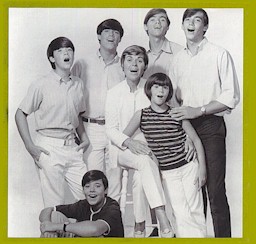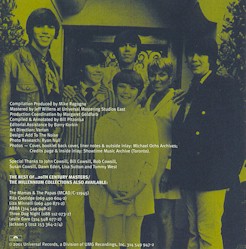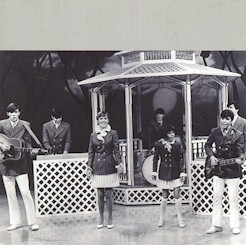

|
In the '6os, the Cowsills were America's first family of pop. The singing siblings and their musical mom racked up a respectable run on the record charts during the latter half of that decade, just as rock was going through its angry adolescent phase. Given the sunny disposition displayed
on their biggest hits — an image bolstered by a high-profile ad campaign as the spokes family for milk — the Cowsills were unfairly lumped in with the artificially sweetened bubblegum acts of the day. But the twelve tracks herein chronicle the work of a talented group of musicians whose well-deserved time in the spotlight was more than a decade in the making.
Around 1956, eldest brothers Bill and Bob (ages eight and seven respectively) taught themselves how to play four-string guitars—souvenirs brought home by their Navy father, Bud. Their ersatz Everly Brothers bit worked well enough for a long while until the British Invasion rocked the nation in 1964, when Bill and Bob recruited ten-year-old brother Barry to play drums. Three became four when Barry switched to bass and drumming duties were delegated to youngest brother, eight year-old John. Often doing four sets a night, the boys honed their chops performing around their hometown of Newport, Rhode Island. In 1965, they recorded their first single for Johnny Nash's JoDa label.
The following year, scouts from NBC's Today show came up from New York City and booked the boys on the program. Mercury Records chief Shelby Singleton caught the Cowsills' performance and signed them to the Philips subsidiary. Their label debut, "Most Of All," was a huge hometown hit which managed to bubble under the Billboard Hot 100 for a few weeks that July.
Despite the fact the guys were seasoned veterans with aspirations of performing harder-edged material, Singleton saddled them with a string of juvenile novelties. Philips staff writer/producer Artie Kornfeld sympathized with their plight and used his connections to bring the brothers over to MGM. When label brass inquired if the boys' mother sang as well, Bud, a self-admitted tough taskmaster who ran the family like a tight ship, immediately drafted his wife Barbara into musical service. The boys were beleaguered by the change of events, but MGM ponied-up $250,000 to promote "The Rain, The Park And Other Things" — a pop-perfect flower-power story song which raced to #2 in December 1967 — stalled behind the Monkees' "Daydream Believer." Their self-titled debut album spent four months on the charts, and the gatefold photo of a typical Cowsill dinner served with lots of milk garnered a million-dollar contract from the American Dairy Association.
If having your mom in the band was a cute gimmick, having your baby sister in the band was even cuter. And so eight-year-old Susan joined the fold for their sophomore album, We Can Fly, just as Bill and Bob took over as producers. The title track ascended to #21 in February 1968, while "In Need Of A Friend" could only find its way to #54 that April.
For the third album, Captain Sad And His Ship Of Fools, sixteen-year-old Paul got promoted from roadie to keyboardist. In an effort to shore up the Cowsills' chart performance, MGM hired hit-making producer Wes Farrell ("Come On Down To My Boat" by Every Mother's Son). The family very grudgingly recorded "Indian Lake" (their biggest hit) written by longtime Farrell stalwart Tony Romeo. But the single did return the family to the Top 10 in July. Romeo was impressed with the family's innate sense of harmony. In fact, the Cowsills (primarily Bill and Bob) always worked out their own vocal arrangements no matter what the label credits claimed. The Farrell-Romeo connection also yielded "Poor Baby," which crawled up to #44 in October. By the end of the year, MGM moved its record division from New York to Los Angeles, and its favorite singing family followed.
"Indian Lake" began as a bit that they were asked to perform on a television fashion special, The Wonderful World Of Pizzazz, in March 1969. The counterculture rock musical Hair had taken the country by storm, and Pizzazz producer Carl Reiner thought it would be a kick to have the clean-cut family perform the title song bedecked in long wigs and leather. By all accounts, recording was an arduous but rewarding affair since it was the first time the Cowsills played all the instruments themselves. They were justifiably proud of the final result, but MGM wouldn't issue the single until the Cowsills visited an influential Chicago radio station and let the DJ play the demo on the air. Immediate positive response forced MGM's hand. The single came out and hit #2 in May, clipped by another Hair cut, "Aquarius/Let The Sunshine In" by The Fifth Dimension. "Hair" was too late to make the Best Of The Cowsills collection, so MGM rushed out a live album of cover versions recorded while the family was on tour.
The success of "Hair" proved that the group was making huge steps forward musically, but at the same time, the pressure was on to maintain the family's wholesome image. The strain was especially difficult on Bill, who was hanging out with Brian Wilson—who was having family crises of his own. When Bud scheduled the family to play Las Vegas with Wayne Newton, Bill quit the band.
While performing at the San Remo song festival in Italy, the Cowsilts were approached about recording "The Prophecy Of Daniel And John The Divine (Six-Six-Six)" written by avant garde jazz musician Remo Capra. It was the group's most ambitious and experimental single, an epic literally of biblical proportions. But a multi-movement mini-movie borrowed from The Book of Revelations proved a bit too far afield, and struggled to #75 in July.
Bob "Waddy" Wachtet had been a friend of the family since the Newport days, and followed the Cowsills out to the coast. In the decade to follow, Waddy would become a sought-after studio guitarist and a big proponent of the California country-rock sound. But his production of their version of "Silver Threads And Golden Needles" was just a few years ahead of the curve and the single got snagged at #74 in September.
Mere months after they kept the Cowsills from the #1 spot, the Monkees went off the air. Soon thereafter, Screen Gems started looking for another music-themed television property and the Cowsills seemed like they'd fit the bill. Execs camped out with the family for a few days, but many of the boys were in the most anguished stages of adolescence and beyond consideration. The singing family concept remained, but Shirley Jones was signed to play the mother for The Partridge Family. Young John Cowsill was thrilled with this casting decision because he had a huge crush on the star of Oklahoma! and Carousel. The Cowsills may not have gotten their own TV series, but for one season they could be heard singing the theme to ABC's comedy anthology, Love American Style.
As the family began putting together their fourth studio album, a still-estranged Bill approached them with a song he had written, "II x II," conveniently credited to David W. Ray. The Cowsills' upbeat version was released as a single and served as the title track. Bill performed a more lugubrious version on his MGM solo album, Nervous Breakthrough, which featured as its single the harmony-laden-yet-ironically-titled "When Everybody's Here."
The Cowsills left MGM in 1970 when new label president Mike Curb turned his attention to another singing family—the Osmonds. The Cowsills signed on as the first American act for London Records, which had been the stateside clearinghouse for British Decca. Bill returned for a couple singles before the band split up in 1972. The individual Cowsills all maintained careers in music throughout the years, working with Lindsay Buckingham (in his early band Bridey Murphey), DwightTwilley, Phil Seymour, the Beach Boys, and the Continental Drifters (which currently features Susan and husband Peter Holsapple along with former Bangle Vicki Peterson). In 1989, Bob, Paul, John and Susan started performing together and in the late '90s, they released a new album, Global. In 2000, all the Cowsill siblings (including Bob's twin brother Dick, who served as the family roadie during the '6os salad days) performed together at the Taste Of Rhode Island summer festival in Newport. Unfortunately, neither Mom nor Dad were around to see the reunion (Barbara died in 1985, Bud in 1992). Even as they've continued to expand their repertoire with new material, they still perform their biggest hits. And their harmonies are still note-perfect. As this collection attests, the Cowsills definitely are one talented family.
Bill Pitzonka
April 2001
|


|
|
Compilation Produced by Mike Ragogna
Mastered by Jeff Willens at Universal Mastering Studios East
Production Coordination by Margaret Goldfarb
Compiled & Annotated by Bill Pitzonka
Editorial Assistance by Barry Korkin
Art Direction: Vartan
Design: Add To The Noise
Photo Research: Ryan Null
Photos — Cover, booklet back cover, liner notes & outside inlay: Michael Ochs Archives; Credits page & inside inlay: Showtime Music Archive (Toronto).
Special Thanks to John Cowsill, Bill Cowsill, Bob Cowsill, Susan Cowsill, Dawn Eden, Lisa Sutton and Tommy West
THE BEST OF...20TH CENTURY MASTERS
THE MILLENNIUM COLLECTIONS ALSO AVAILABLE:
The Mamas & The Papas (MCAD/C-11945)
Rita Cooiidge (069 490 604-2]
Liza Minnell (069 490 871-2)
ABBA (314 549 948-2)
Three Dog Night (088 112 073-2)
Leslie Gore (314 548 077-2)
Jackson 5 (012 153 364-2/4)
2001 Universal Records, a Division of UMG Recordings, Tnc.
|

|
*1. MOST OF ALL
(Gary Geld & Peter Udell)
Philips single 40382; Pop #118,1966
Produced by Artie Kornfeld
From the Wing album, The Cowsills Plus The Lincoln Park Zoo, SRW 16354
*2. THE RAIN, THE PARK & OTHER THINGS
(Arthur Kornfeld & Steve Duboff)
MGM single 13810; Pop #2,1967
Produced by Artie Kornfeld
Arranged by)irnmy "Wiz" Wisner
From the MGM album, The Cowsills, SE-4498
*3. WE CAN FLY
(Bill Cowsill, Bob Cowsill, Arthur Kornfeld & Steve Duboff)
MGM single 13886; Pop #21,1968
Produced by Bill Cowsill & Bob Cowsill
Arranged by Artie Schroeck
From the MGM album, We Can Fly, SE-4534
4. IN NEED OF A FRIEND
(Bill Cowsill & Bob Cowsill)
MGM single 13909; Pop #54,1968
Produced by Bill Cowsill & Bob Cowsill
Arranged by Herb Bernstein
From the MGM album, We Can Fly, SE-4534
S.INDIAN LAKE
(Tony Romeo)
MGM single 13944; Pop #10,1968
Produced by Wes Farrell
Arranged by Tony Romeo
From the MGM album, Captain Sad And His Ship Of Fools, SE-4554
*6. POOR BABY
(Tony Romeo)
MGM single 13981; Pop #44,1968
Produced by Wes Farrell
Arranged by Tony Romeo
From the MGM akbum, The Best Of The Cowsills, SE-4594
|
|
*7. HAIR
(James Rado, Gerome Ragni & Gait MacDermot)
MGM single 14026; Pop #2,1969
Produced by Bill Cowsill & Bob Cowsill
From the MGM album, The Cowsills In Concert, SE-4619
*8. THE PROPHECY OF DANIEL & JOHN THE DIVINE (SIX-SIX-SIX)
(Remo Capra)
MGM single 14063; Pop #75,1969
Produced & Arranged by Bob Cowsill
From the MGM album, IIx II, SE-4639
9. SILVER THREADS AND GOLDEN NEEDLES
(Jack Rhodes & Dick Reynolds)
MGM single 14084; Pop #74,1969
Produced & Arranged by Bob Wachtel
From the MGM album, IIx II, SE-4639
10.II X II
(David Warren Ray a.k.a. Bill Cowsill)
MGM single 14106; 1970
Produced by Bob Cowsill
From the MGM album, IIx II, SE-4639
*22. LOVE AMERICAN STYLE
(Charles Fox & Arnold Margolin)
MGM single 14084(6); 1969
Produced by Bob Cowsill
From the MGM album, All Time Hits, GAS-103
12. WHEN EVERYBODY'S HERE - Bill Cowsill
(Bill Cowsill)
MGM single 14166; 1970
Produced & Arranged by Bill Cowsill
From the MGM album, Nervous Breakthrough, SE-47o6
* Single versions
|

|
|













